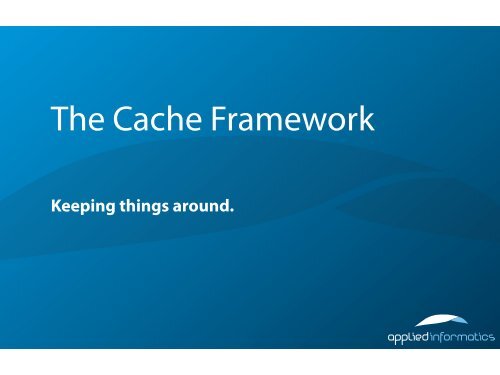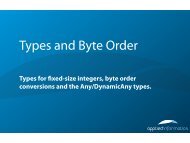The Cache Framework - Poco
The Cache Framework - Poco
The Cache Framework - Poco
Create successful ePaper yourself
Turn your PDF publications into a flip-book with our unique Google optimized e-Paper software.
<strong>The</strong> <strong>Cache</strong> <strong>Framework</strong><br />
Keeping things around.
Overview<br />
> Motivation<br />
> Features<br />
> Interface<br />
> Examples<br />
> Performance Costs<br />
> Memory Costs
Why Caching?<br />
> STL containers make a good job in allowing you to store data<br />
> but you can't limit the size of the container, a map/set can<br />
potentially grow to infinite size<br />
> you can't let elements expire<br />
> POCO's caching framework supports exactly that<br />
> only std::map like behavior is supported so far<br />
> don't use caching if you don't need these properties<br />
(more on that in the "Costs" section)
Features<br />
> POCO's caching framework supports the two most commonly<br />
used cache algorithms<br />
> Least Recently Used (LRU)<br />
> Size limited<br />
> Keeps the last accessed elements in cache<br />
> Time based expiration<br />
> Not size limited<br />
> Either with a default time value applied to all entries or a<br />
unique time value<br />
> Combinations: LRU combined with expiration
Classes<br />
> <strong>Poco</strong>::LRU<strong>Cache</strong><br />
#include "<strong>Poco</strong>/LRU<strong>Cache</strong>.h"<br />
> <strong>Poco</strong>::Expire<strong>Cache</strong><br />
#include "<strong>Poco</strong>/Expire<strong>Cache</strong>.h"<br />
> <strong>Poco</strong>::UniqueExpire<strong>Cache</strong><br />
#include "<strong>Poco</strong>/UniqueExpire<strong>Cache</strong>.h"<br />
> <strong>Poco</strong>::ExpireLRU<strong>Cache</strong><br />
#include "<strong>Poco</strong>/ExpireLRU<strong>Cache</strong>.h"<br />
> <strong>Poco</strong>::UniqueExpireLRU<strong>Cache</strong><br />
#include "<strong>Poco</strong>/UniqueExpireLRU<strong>Cache</strong>.h"
Classes (cont)<br />
> <strong>Poco</strong>::AccessExpire<strong>Cache</strong><br />
#include "<strong>Poco</strong>/AccessExpire<strong>Cache</strong>.h"<br />
> <strong>Poco</strong>::AccessExpireLRU<strong>Cache</strong><br />
#include "<strong>Poco</strong>/AccessExpireLRU<strong>Cache</strong>.h"<br />
> <strong>Poco</strong>::UniqueAccessExpire<strong>Cache</strong><br />
#include "<strong>Poco</strong>/UniqueAccessExpire<strong>Cache</strong>.h"<br />
> <strong>Poco</strong>::UniqueAccessExpireLRU<strong>Cache</strong><br />
#include "<strong>Poco</strong>/UniqueAccessExpireLRU<strong>Cache</strong>.h"
Interface: Abstract<strong>Cache</strong><br />
> Realized as template<br />
> void add(const TKey&, const TVal&)<br />
replaces existing entries<br />
> void remove(const TKey&)<br />
> bool has(const TKey&)<br />
> <strong>Poco</strong>::SharedPtr get(const TKey&)<br />
> void clear()<br />
> std::size_t size()<br />
> void forceReplace()<br />
> TStrat is the strategy used for cache replacement
Getting Elements<br />
> Why return a SharedPtr?<br />
> accessing a cache triggers cache replacement<br />
(add(), but also get(), size())<br />
> a thread-safe cache must guarantee that no outside data gets<br />
invalidated by replacement, thus<br />
> we can't return a reference/pointer<br />
> we have no iterators for cache<br />
> we had a choice: return a copy or return a SharedPtr<br />
> SharedPtr is cheaper than copying.
Interface – Events<br />
> FIFOEvent Add<br />
FIFOEvent Remove<br />
FIFOEvent Get<br />
FIFOEvent Clear<br />
> Events are thrown before the operation is performed<br />
> Useful for:<br />
> profiling a cache<br />
> GUI Code to visualize cache content
#include "<strong>Poco</strong>/LRU<strong>Cache</strong>.h"<br />
[...]<br />
<strong>Poco</strong>::LRU<strong>Cache</strong> my<strong>Cache</strong>(3);<br />
my<strong>Cache</strong>.add(1, "Lousy"); // |-1-| -> first elem is the most popular one<br />
<strong>Poco</strong>::SharedPtr ptrElem = my<strong>Cache</strong>.get(1); // |-1-|<br />
my<strong>Cache</strong>.add(2, "Morning"); // |-2-1-|<br />
my<strong>Cache</strong>.add(3, "USA"); // |-3-2-1-|<br />
// now get rid of the most unpopular entry: "Lousy"<br />
my<strong>Cache</strong>.add(4, "Good"); // |-4-3-2-|<br />
poco_assert (*ptrElem == "Lousy"); // content of ptrElem is still valid<br />
ptrElem = my<strong>Cache</strong>.get(2); // |-2-4-3-|<br />
// replace the morning entry with evening<br />
my<strong>Cache</strong>.add(2, "Evening"); // 2 Events: Remove followed by Add
Time Based Expiration<br />
> Expire<strong>Cache</strong> has a default timeout for all values<br />
(600000 ms = 10 minutes)<br />
> <strong>Poco</strong>::Expire<strong>Cache</strong> e; // 10min<br />
> <strong>Poco</strong>::Expire<strong>Cache</strong> e(1000); // 1sec<br />
> UniqueExpire<strong>Cache</strong> has unique expire value per element<br />
> each value type must implement<br />
const <strong>Poco</strong>::Timestamp& getExpiration()<br />
> for builtin C++ data types use<br />
<strong>Poco</strong>::ExpirationDecorator
#include "<strong>Poco</strong>/UniqueExpire<strong>Cache</strong>.h"<br />
#include "<strong>Poco</strong>/ExpirationDecorator.h"<br />
[...]<br />
typedef <strong>Poco</strong>::ExpirationDecorator ExpString;<br />
<strong>Poco</strong>::UniqueExpire<strong>Cache</strong> my<strong>Cache</strong>;<br />
my<strong>Cache</strong>.add(1, ExpString("test", 500)); // expires after 500ms<br />
my<strong>Cache</strong>.add(2, ExpString("test", 1500)); // expires after 1500ms<br />
poco_assert (my<strong>Cache</strong>.size() == 2);<br />
// 1 second passes...<br />
poco_assert (my<strong>Cache</strong>.size() == 1);<br />
<strong>Poco</strong>::SharedPtr ptrVal = my<strong>Cache</strong>.get(1);<br />
poco_assert (ptrVal.isNull());
Expiration based on last access time<br />
> AccessExpire<strong>Cache</strong>:<br />
elements in the cache expire if they are not accessed within a<br />
given cache specific time interval<br />
> UniqueAccessExpire<strong>Cache</strong>:<br />
the time interval can be defined for each individual element of<br />
the cache
<strong>Cache</strong> Internals<br />
> Abstract<strong>Cache</strong> uses a <strong>Cache</strong>Strategy:<br />
> LRUStrategy for LRU<strong>Cache</strong><br />
> ExpireStrategy for Expire<strong>Cache</strong><br />
> ExpireLRU<strong>Cache</strong> uses StrategyCollection containing:<br />
> LRUStrategy<br />
> ExpireStrategy<br />
> UniqueExpireStrategy uses StrategyCollection containing:<br />
> LRUStrategy<br />
> UniqueExpireStrategy
<strong>Cache</strong> Performance<br />
> A cache is slower than a std::map:<br />
> cache replacement costs time<br />
> most expensive method: add()<br />
> first search and remove an old entry<br />
> insert into the Abstract<strong>Cache</strong><br />
> then insert into the Strategy<br />
> do cache replacement
<strong>Cache</strong> Performance (cont'd)<br />
> Costs<br />
> all operations are still O(log(n))<br />
> exact: O((x + numofstrategies) * (log(n))<br />
i.e. ExpireLRU<strong>Cache</strong> is more expensive than LRU<strong>Cache</strong><br />
> x:={1, 2} depending on method called
<strong>Cache</strong> Performance (Memory)<br />
> Abstract<strong>Cache</strong> without strategy requires approx. the same<br />
memory as a std::map; overhead is one SharedPtr object per<br />
entry.<br />
> Additional overhead per strategy:<br />
each must store the keys at least<br />
> Strategies are optimized for speed not memory.<br />
Typically, you need two different views on the keys so you can<br />
guarantee O(log(n)), otherwise you would end up with O(n).
<strong>Cache</strong> Performance (Memory per Entry)<br />
> Base costs: sizeof(TKey)+sizeof(TVal)<br />
> LRU<strong>Cache</strong>:<br />
sizeof(<strong>Poco</strong>::SharedPtr) + sizeof(TKey)*2<br />
+ sizeof(std::list::iterator)<br />
> Expire<strong>Cache</strong>, AccessExpire<strong>Cache</strong>:<br />
sizeof(<strong>Poco</strong>::SharedPtr) + sizeof(TKey)*2<br />
+ sizeof(std::multimap::iterator) + sizeof(<strong>Poco</strong>::Timestamp)<br />
> UniqueExpire<strong>Cache</strong>, UniqueAccessExpire<strong>Cache</strong>:<br />
sizeof(<strong>Poco</strong>::SharedPtr) + sizeof(Key)*2<br />
+ sizeof(std::multimap::iterator)
<strong>Cache</strong> Performance (Memory per Entry)<br />
> ExpireLRU<strong>Cache</strong>, AccessExpireLRU<strong>Cache</strong>:<br />
sizeof(<strong>Poco</strong>::SharedPtr) + sizeof(TKey)*4<br />
+ sizeof(std::multimap::iterator) + sizeof(std::list::iterator)<br />
+ sizeof(<strong>Poco</strong>::Timestamp)<br />
> UniqueExpireLRU<strong>Cache</strong>, UniqueAccessExpireLRU<strong>Cache</strong>:<br />
sizeof(<strong>Poco</strong>::SharedPtr) + sizeof(TKey)*4<br />
+ sizeof(std::multimap::iterator) + sizeof(std::list::iterator)
Tips<br />
> <strong>Cache</strong>s offer expiration and LRU support – if you don't need<br />
these features, don't use cache!<br />
> Time based expiration works without a background thread<br />
> if nobody accesses the cache, nothing will be replaced<br />
> you can call forceReplace()<br />
> Caching <strong>Framework</strong> is extensible:<br />
extend <strong>Poco</strong>::AbstractStrategy to implement new strategies, or<br />
combine them with existing strategies
Tips (cont'd)<br />
> don't use has() followed by get(), it's faster (and safer with<br />
expiration) to go directly to get and check if the returned<br />
SharedPtr contains null<br />
> <strong>Cache</strong> resembles a std::map, for set functionality, use <strong>Poco</strong>::Void<br />
as value:<br />
<strong>Poco</strong>::LRU<strong>Cache</strong>
Copyright © 2006-2010 by Applied Informatics Software Engineering GmbH.<br />
Some rights reserved.<br />
www.appinf.com | info@appinf.com<br />
T +43 4253 32596 | F +43 4253 32096
















